In this article:
Many people choose to consume a low-sugar or sugar-free alternative for various reasons.
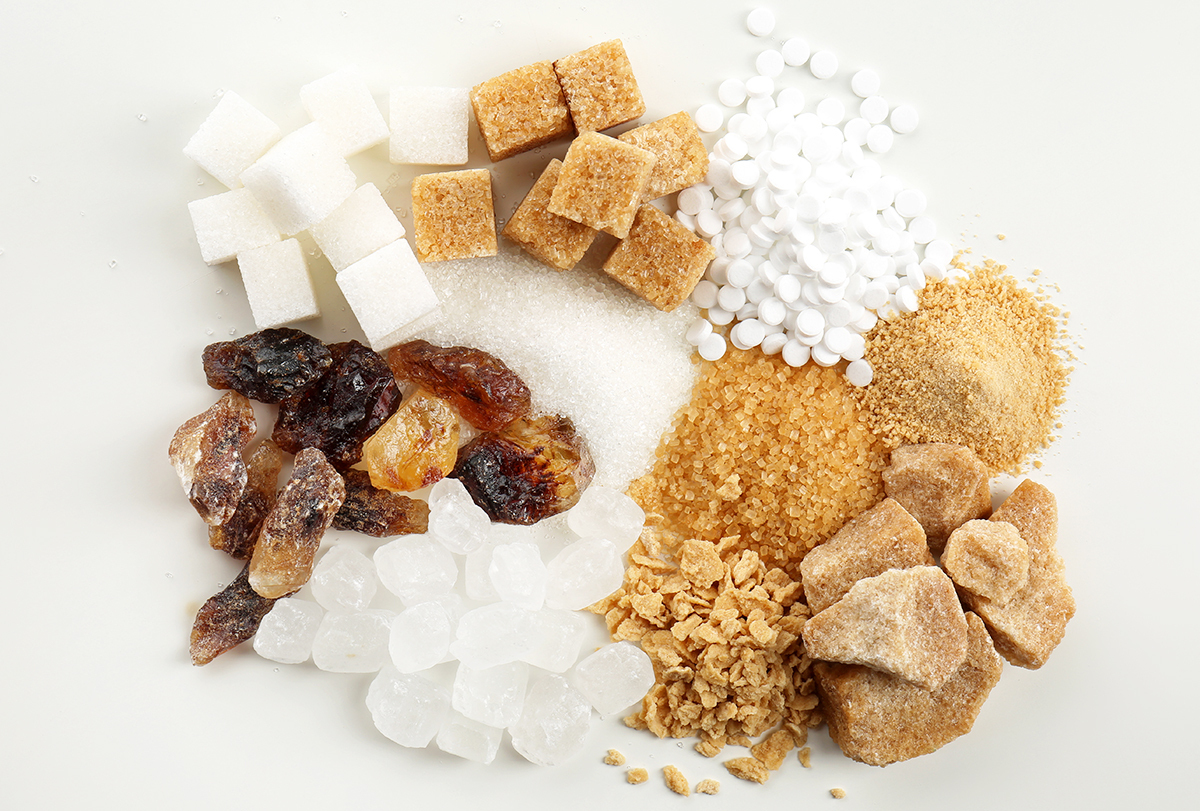
It could be because of type 2 diabetes, insulin resistance, or obesity – all of which can occur as a consequence of high amounts of sugar in the daily diet. (1) Or it could entirely be a personal choice.
But going on a sugar-free or low-sugar diet doesn’t mean that you have to give up on the taste of the foods you love and are familiar with.
Several sugar-free alternatives have become available that make the transition to a low-sugar diet easy. Also, natural sweeteners provide more micronutrients than plain white sugar, making them a slightly healthier choice.
Top Sugar Alternatives
Here are some of the best sugar alternatives and natural sweeteners that can be used instead of white sugar.
1. Stevia
Stevia is obtained from the leaves of the stevia shrub. It is also called sweet leaf or sweet weed and is native to Argentina, Brazil, and Paraguay. (2)
Steviol, the natural glycoside in stevia, contributes to its sweetness with zero calories. Stevia can be safely consumed by people with diabetes and those who wish to reduce their weight. (2)
The plant also has antibacterial, anti-inflammatory, antiseptic, and diuretic properties. It can also reduce blood pressure, making it a safe sweetener choice for people with heart diseases. (2)
Moreover, stevia also has a beneficial effect on skin conditions such as acne, eczema, and dermatitis. (2)
2. Monk fruit
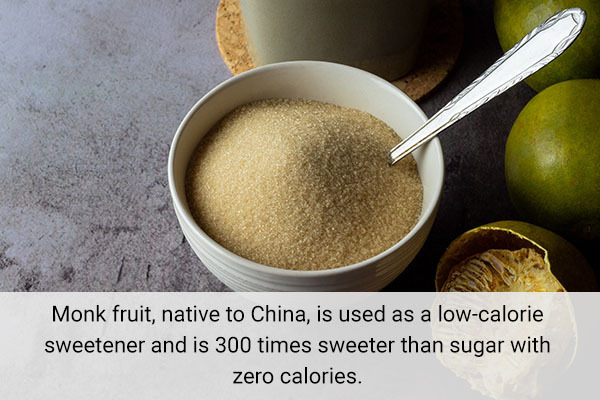
Monk fruit, native to China, is used as a low-calorie sweetener and is 300 times sweeter than sugar with zero calories. (3) A compound called mogroside contributes to the sweetness of this fruit. (3)
Human trials are still lacking on the efficacy of this sweetener in various chronic illnesses. However, due to its lack of calories, it can be used as a sweetener for people on a weight loss diet.
3. Dates
Though dates aren’t zero calories like stevia or monk fruit, they have a low glycemic index and a lot more antioxidants than white sugar. (4)
The glycemic index is a measure of how quickly carbohydrates and sugar are released from the food into the blood. Foods with a low glycemic index are advised for people with diabetes and insulin resistance. (5)
Studies have shown that the components in dates are anti-glycemic and anti-inflammatory. They also possess some anti-obesity activity. (4)
In one study, consumption of dates improved cholesterol levels and did not increase the weight of individuals with diabetes. (4)
4. Fruit purees
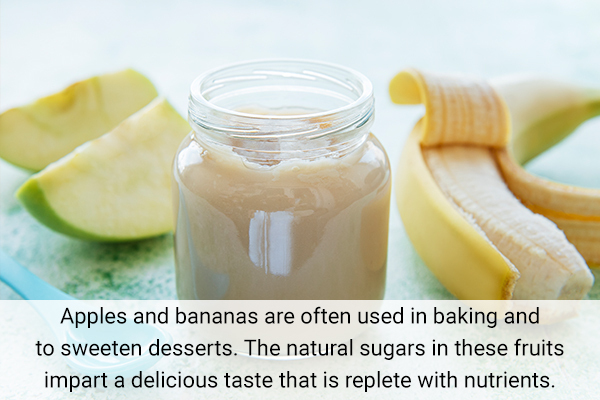
Fruits and their unsweetened natural products have a variety of health benefits. Rich in antioxidants, vitamins, and minerals, they can show protective effects against heart diseases, diabetes, and some types of cancers. (6)
Apples and bananas are often used in baking and to sweeten desserts. The natural sugars in these fruits impart a delicious taste that is replete with nutrients.
5. Honey
Honey is considered an antidiabetic agent. It is rich in fructose, a type of carbohydrate that imparts sweetness. (7) Also, honey has a low glycemic index and a rich micronutrient profile, making it a better sweetener than plain sugar.
In a study on individuals with diabetes, consumption of honey for 8 weeks increased their levels of HbA1c (a measure of glucose in the blood) but reduced their waist measurements, indicating some weight loss. (7)
These results suggest that consuming honey, especially for people with diabetes, needs to be done with caution.
6. Yacon syrup
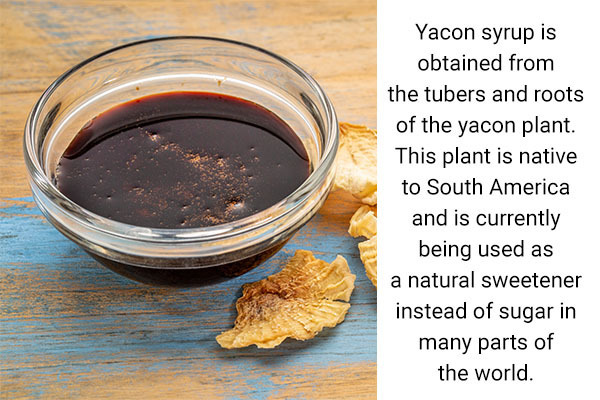
Yacon syrup is obtained from the tubers and roots of the yacon plant (Smallanthus sonchifolius). This plant is native to South America and is currently being used as a natural sweetener instead of sugar in many parts of the world. (8)
Yacon contains three times lesser calories than sugar due to its rich inulin content. (9) Animal studies have demonstrated its effect on controlling blood sugar levels and reducing cholesterol levels in the blood. (8)
In human studies, yacon has shown anti-inflammatory, antioxidant, immune-boosting, and weight-managing properties. (8)
7. Maple syrup
Maple syrup is obtained from boiling the sap of the sugar maple tree (Acer saccharum L.), which is largely cultivated in Canada.
Maple syrup is available in varying degrees of darkness. (10) It is rich in many vitamins including riboflavin, niacin, and thiamine and minerals including potassium, calcium, magnesium, sodium, zinc, and iron. It is also rich in phenolic compounds that confer several health benefits. (10)
Since maple syrup contains sucrose in addition to fructose and glucose, it should be consumed in moderation, especially by people with diabetes. (10)
8. Agave
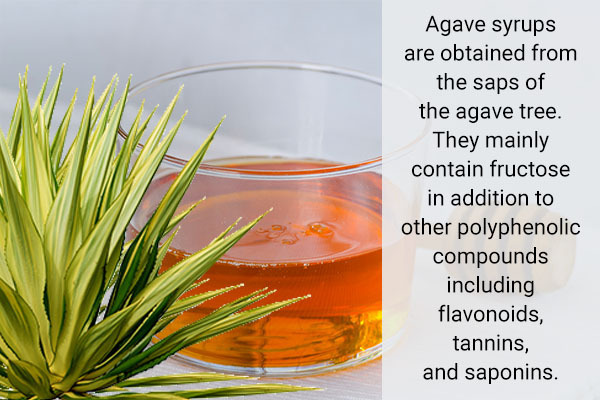
Agave syrups are obtained from the saps of the agave tree. (11) They mainly contain fructose in addition to other polyphenolic compounds including flavonoids, tannins, and saponins. (11)
Agave syrup is used in many baked goods and desserts for its sweetness. It has known health benefits against diabetes and obesity. (12)
9. Sugar alcohols
Sugar alcohols are the first type of noncaloric sweeteners to have appeared on the market. They provide lesser calories than sugar and are mainly available as xylitol and erythritol, sold under different brand names. (13)
Sugar alcohols can cause some stomach disturbances when consumed in large amounts, so it is advisable to be cautious in their consumption. (14)
10. Allulose
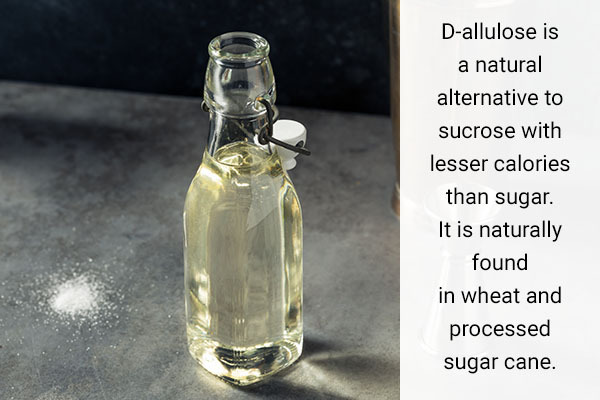
D-allulose is a natural alternative to sucrose with lesser calories than sugar. It is naturally found in wheat and processed sugar cane.
Studies have reported that it can regulate the digestion of fat, protect the nerves, and exert anti-obesity effects. (15)
Overconsumption of allulose can cause bloating, diarrhea, and stomach pain. It is ideal to stick to the recommended maximum daily dose of 0.9 g per kg body weight. (16)
Precautions to Consider
While most of the recommended natural sweeteners are low in calories and contain more micronutrients than table sugar, it is crucial to remember that:
- They are still sweet and can potentially raise your blood sugar level if overconsumed.
- Human trials are limited and the consumption of sweeteners should be kept to a minimum if you have diabetes or are trying to manage your weight.
Most-Asked Questions About Natural Sweeteners and Sugar Alternatives
Are some sweeteners bad for health?
Alternatives to sugar such as stevia, monk fruit, maple syrup, and agave are obtained from plant sources and generally are safe to consume in limited dosages.
What is the best sugar alternative?
Depending on the need, different sugar substitutes can be used. For instance, dates, fruits, and syrups can be used in baking and as toppings on parfaits and oatmeal, whereas powdered stevia, monk fruit, and sugar alcohols can be used to sweeten beverages.
What about molasses as a sugar alternative?
Molasses is the liquid that is left behind after boiling sugarcane or beet syrup. It does have a high antioxidant content that can offer potential health benefits to adults, but it is also high in calories compared to some other low-calorie sweeteners. (17)
Final Word
Natural sweeteners and alternatives to sugar provide a great way for people looking to cut back on sugar in their diet to still maintain the flavor of their favorite foods. Whether they are used to control weight and diabetes or for general health maintenance, sugar alternatives can make the transition to a sugar-free or low-sugar diet much easier.
Among the sugar alternatives available, stevia, monk fruit, maple syrup, agave, and yacon syrup are obtained from plants. They are rich in antioxidants and can offer much more health benefits than table sugar.
Honey, fruit, and dates, on the other hand, are natural foods that can be used to sweeten various dishes. The presence of vitamins and minerals in these foods can add to the nutritional value of the meal and also protect against certain illnesses.
- Was this article helpful?
- YES, THANKS!NOT REALLY


